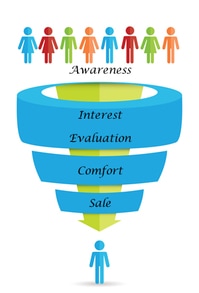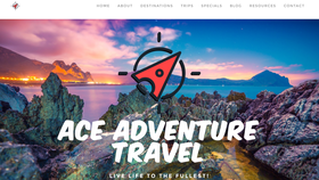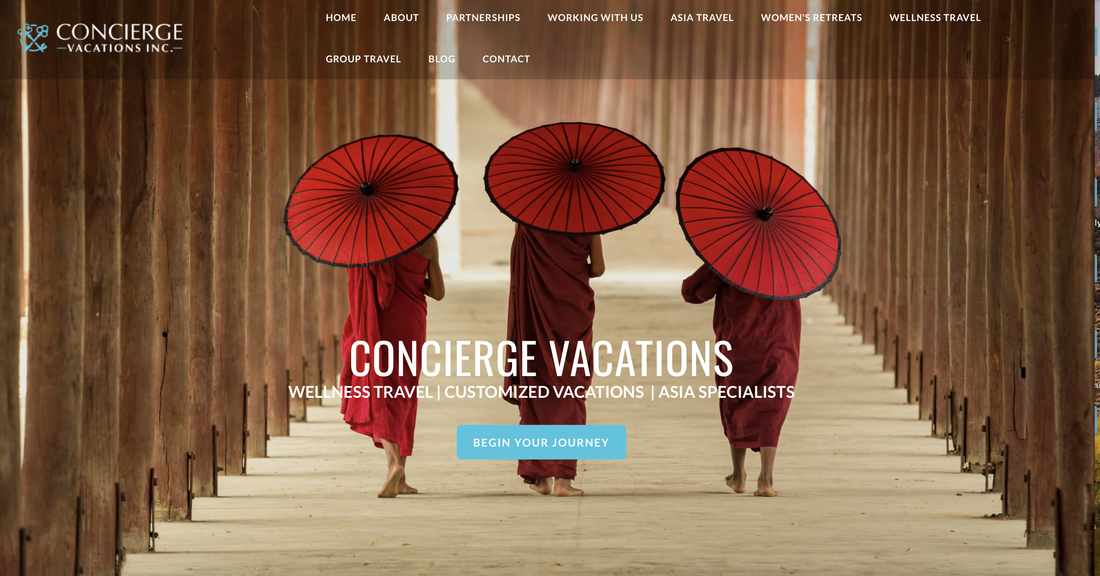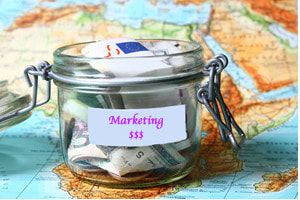 Marketing has two goals: the retention of existing clients and the acquisition of new clients. From existing clients you achieve stability and it is from new clients you achieve growth. When you design your marketing properly, both your existing clients and new clients first notice or are reminded of your presence, investigate your offerings and finally enter into conversation with you about the services or products you offer. At this stage you have an actionable lead and enter into the sales cycle. The process of drawing the potential client closer and closer to you, finally resulting in an actionable lead, is sometimes referred to as the “Marketing Funnel.”
0 Comments
 I often hear travel professionals complain they are making no sales from their websites. To my ear, the complaint, however, sounds a bit strange. If you are making “sales” from your website, I suspect you are using a booking engine or a search engine geared to supplier specials, much like Travelocity or Expedia. However, for personal travel consultants, a website is far more of a marketing tool than a sales tool. The difference is an important one to consider. Firstly, every website should be designed with the business model of the company behind it in mind. There is no “one site fits all” website. If your business model resembles that of Expedia, then you are gearing for great volumes with little personal client interaction. In this scenario, a booking engine or supplier search engine makes sense and your website is indeed a sales tool.  I want to show everyone some great Voyager sites that have been customized by the agents that own them. Most have been customized by the agent, others customized by design people hired by the agent. When we build out a site for you, we build it out using our templates. However, the customization you see on the following sites is completely within your power to do! The brilliance of your site is it can be as individual as your travel practice.  On occasion, a neighbor or an acquaintance, knowing I am somehow connected to the travel industry, will ask me about a vacation they would like to take. I use those opportunities to refer the person to a rotating selection of travel professionals I know. I tend to use different travel advisors depending on the person’s request. Recently, a neighbor asked me about a trip to Thailand she and her family wanted to take next year. I checked with a travel agent friend to see if he wanted the referral and I then put the two of them together. Yesterday, months after our original conversation, I ran into my neighbor and asked how the travel planning had progressed. Looking at me a bit sheepishly she said “Well, your travel agent friend couldn’t find us anything cheaper than we could get online by ourselves.” I explained to my neighbor the travel professional is not about the “best price” but was instead looking for the “best value.” I explained the travel professional was looking after my neighbor’s interests by choosing reliable suppliers, coordinating their travels and acting as their advocates. My neighbor listened, but the lesson was, I fear, arriving too late. Yikes.
I sometimes get an email from a subscriber indicating they are concerned about working with their site because they are "Not good with technology" and are not getting enough leads. I wanted to provide everyone with an email I sent today to one of our agents.
It is really necessary we correctly identify problems. However, we often incorrectly identify a marketing problem as a technology problem as was this agent: How many times have you promised to better organize your digital marketing efforts?  You have a website, a Facebook page, maybe a Twitter account and you started an Instagram page, but they now languish at the back of your marketing plans going nowhere. Are your efforts disjointed, inconsistent and infrequent? If so, you already understand the symptoms of this malaise. Now, let’s explore a cure. Here is the truth of the matter: you will get out of your efforts what you put into them. The better the plan with which you begin, the better the results. Getting customers to your website, creating engagement and initiating a conversation with existing and new clients takes focus and effort. Great websites require a plan and resources.  Every travel agent spending the least bit of time thinking about their travel agency website has heard the truism “Content is King.” I’m here to suggest, however, content is so much more than King, if by “King” you mean it is content bringing visitors to your website through basic search engine marketing. Indeed, it is relevant, original content responsible for most of the organic, (i.e. “free”), traffic visiting your site. However, merely getting visitors to your site is only a first step. In addition, to be successful you need to also entertain (the Jester) and please (the Queen) your visitors, or they will soon be off to find better content and digital turf on which to spend their time. The Knight – he’s the enforcer, the one who makes you write often and well and with great design on a consistent basis. Let’s spend a bit of time at court.
Solid Search Engine Optimization (SEO) is not the arcane and difficult to achieve strategy many would like you to believe. You too can be an SEO superhero without spending a fortune on consultants. No matter how many times Google or the other other search engines refine their algorithms, original content and relevance rise to the top in terms of importance to making SEO work. For travel agency websites, however, the challenge is particularly acute.
Original content is easy: write your own content on topics on which you can write authoritatively. Relevancy is a bit wider topic, however, encompassing a number of factors. The search engines want to display results most relevant to the questioner. Because travel is such a large segment of the transactional traffic on the internet, however, many travel agents feel daunted by the prospect of having to compete with the thousands of other sites for search engine ranking. Yet, with a bit of planning and commitment, a travel agency web site can find itself high in the rankings of the major search engines. The resulting traffic and potential for new sales opportunities can certainly justify the effort and time necessary to accomplish search engine optimization.  Greetings from the Voyager Support team! We wanted to do a quick update on some new features for your Voyager Websites and Social Media Manager. 1. New Content - Did you know we are continually adding new content to our existing Content Library categories? Weekly, new content is added and you can use it to freshen up your website and for social media postings. 2. Video - We are now adding video to your social media feeds, if you participate in the Social Media Manager program, and the response has been excellent.  I often encounter a mindset that sees marketing as an expense. I suppose from the perspective of an accountant, that is absolutely accurate. However, in reality marketing should be viewed as an investment. Think of it this way: marketing is only expensive if it’s not working. If you made 5 dollars every time you spent two marketing dollars you would be spending money all day and be happy about it. Ideally, marketing is an investment. We all live within the constraints of a budget. There are many good things to be said about marketing on a shoestring, on choosing strategies that are smart and that work. Today, however, we are going to talk about avoiding turning our shoestrings into nooses – making mistakes with our marketing dollars that, like bad investments, are nothing but expensive errors. |
AuthorWrite something about yourself. No need to be fancy, just an overview. Archives
August 2023
Categories
All
|
